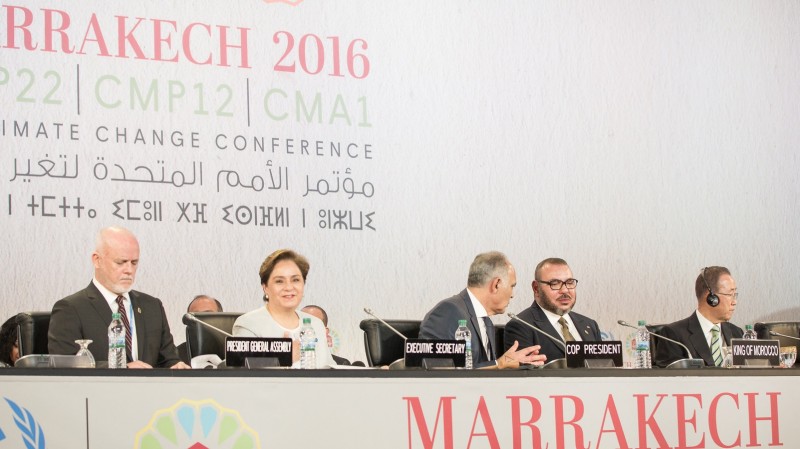India was a vocal presence at the 2015 Paris climate summit, holding regular press conferences and feeding the media a wealth of information on the emerging economy’s green ambitions.
A year on, the country’s climate diplomacy team has gone to ground in the wake of Donald Trump’s election as US president.
Questions posed to staff at the lavish Indian pavilion – which features a giant water feature and a rotating globe decked with wind turbines – are dealt with politely but rarely deliver answers.
And while Chinese diplomats has been vocal supporters of the Paris climate agreement, their Indian counterparts are counselling patience and keeping their cards tight.
“I’ve seen no strong signals from the Indians either way,” said UK climate minister Nick Hurd in a Thursday media briefing. “China intends to stay the course… we understand they are very much in.”
Apart from an intervention on a climate finance roadmap presented by the UK and Australia, “I don’t recall hearing much else from them,” said Mark Lutes, an international climate policy advisor with WWF.
196 countries to Trump: UN must tackle #climatechange – report from #COP22 by @KarlMathiesen https://t.co/Eyj1C7eoWy pic.twitter.com/q1NiyD486h
— Climate Home News (@ClimateHome) November 17, 2016
In a rare appearance in front of the press, environment minister Anil Madhav Dave steered clear of criticising Trump, commenting on Thursday that “power comes and goes”.
“We should not react… instead we should wait a few months more, and then the big [emerging] countries and rest of the world will determine their course.”
While India’s stance may make diplomatic sense, it’s a major concern at these talks. The country – when the EU is counted as one bloc – is the world’s fourth largest greenhouse gas emitter.
A fast-growing middle class, 300 million still stranded off-grid and a heavy reliance on coal frame the country’s vast development challenges.
The government ratified the Paris deal in October, has indicated a willingness to work on a 2050 carbon reduction plan and is leading a global alliance to ramp up solar power.
“I think they are in a state of shock and assessing the new dynamics,” suggested Harjeet Singh, a climate analyst with ActionAid India, by way of explanation for Delhi’s reticence.
Still, at UN summits, the optics matter. Privately, the country has offered reassuring noises said one EU source on Thursday, but not perhaps at the level the bloc had hoped.
Last week one of Dave’s junior negotiators told the Financial Times he feared the US quitting the Paris deal – as Trump has threatened – could become “a contagious disease”.
Report: 196 countries to Trump – UN must tackle climate change
That’s unlikely, business leaders from some of the India’s most polluting sectors told Climate Home on the sidelines of these talks, especially given the regular severe smogs experienced in some of the country’s urban areas.
“Let’s take it as a given… it is going to be challenge… but at this COP progress made by India in solar and renewables has been recognised. It is quite spectacular, even though we say it ourselves,” said Rajiv Mishra from China Light and Power, an energy group with interests across Asia.
“I feel we will beat our [climate plan] target. My own view is we need to do it for our own generation. Our cities – the biggest cities – are not liveable. As an Indian I don’t care what Europe or America says. We need to do it for our own sake.”
Mahendra Singhi, CEO of Dalmia Cement – one of the country’s leading manufacturers – dismissed the US impact, adding if he met Trump he would “ask him to live for a day in Beijing or live for a day in Delhi” to experience the pollution impacts on communities.
“I would tell him look at future generations, your own children and grandchildren,” said Ramesh Kymal, chairman of Gamesa Renewables. “We have an opportunity for better business and the environment. The earth has been forgiving till now but we have reached a tipping point.”
